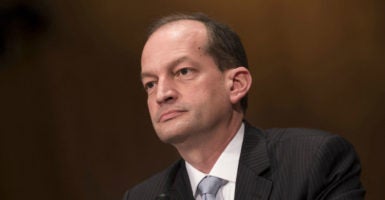A costly and burdensome rule issued by the Obama administration is set to go into effect Friday, barring action from the Department of Labor to delay it.
Unfortunately, the new secretary of labor isn’t acting. Instead, he is tacitly undermining the president’s agenda on financial regulation.
The rule at hand is the fiduciary rule. President Donald Trump issued an executive order in February specifically to rescind or revise this rule, which is designed to provide a single standard for anyone providing retirement advice.
The president also signed an order making it the official policy of the new administration to “empower Americans to make independent financial decisions and informed choices in the marketplace, save for retirement, and build individual wealth.”
It made perfect sense for the president to pair these two orders together because President Barack Obama’s fiduciary rule, which had not yet taken effect, is the polar opposite of empowering people to make their own financial decisions. It is paternalistic regulation at its worst.
The fiduciary rule would impose a one-size-fits-all approach on a very diverse set of financial advisers. It is likely to lead to many unintended consequences, such as less investment advice for average Americans, higher compliance costs, wasteful litigation, and fewer investment options for low-income individuals.
It represents everything that has been wrong with financial regulation for decades.
There are too many federal regulators, and too many rules dictating what people can do.
A far better approach would be to focus regulators on preventing fraud and providing rules so that people have the information necessary to make informed decisions.
Conservatives have been making this case for years, so many were thrilled with the president’s first two executive orders.
Inexplicably, it now appears that Secretary of Labor Alex Acosta is about to leave the Obama rule in place. The spectacle of a Cabinet-level department essentially flouting the administration’s stated policy is, to say the least, bizarre.
The presidential memorandum on the fiduciary rule requires the labor secretary to “prepare an updated economic and legal analysis concerning [the rule’s] likely impact.”
Exactly what happened is unclear, but it seems that the department staff refused to begin the analysis (even though the department did delay the implementation of the rule until June 9).
Then, in an even stranger twist, Acosta proclaimed, in a Wall Street Journal op-ed, that his department has “found no principled legal basis to change the June 9 date while we seek public input.”
Aside from whether this decision violates the spirit of the presidential memo, it is simply incorrect to argue that there is no legal basis to further delay the rule.
The rule is currently being challenged in court, and the Securities and Exchange Commission is seeking public comment on its own fiduciary standard for brokers.
The lawsuits alone provide a clear legal avenue for delaying the rule under Section 705 of the Administrative Procedures Act. Section 705 states that “[W]hen an agency finds that justice so requires, it may postpone the effective date of action taken by it, pending judicial review.”
This regulation has the potential to pull millions of dollars out of the economy with no clear benefit, harming low- and middle-income Americans by taking away investment choices and increasing the costs of those that remain.
Fortunately, the Trump administration’s stated policy is to “empower Americans to make their own financial decisions,” a sharp break from the way the Obama administration viewed people.
Time is running out, but Trump’s labor secretary still has a chance to fulfill the letter and spirit of the president’s order.
The choice is clear: The secretary should delay the rule until the department, working with the Securities and Exchange Commission, can complete a new economic and legal analysis.




























